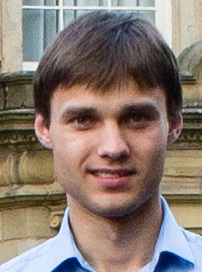You are here: Centre for Doctoral Training in Molecular-Scale Engineering > Our Students >Roberts Rimsa
Roberts Rimsa

Background
In 2013 I graduated from the University of Leeds with a Bachelor of Science in Nanotechnology. My course was mainly focused on the ‘physical’ side of nanotechnology, i.e. materials science, electrical engineering and physics. I did my final year project in the Bioelectronics lab at the School of Electronic and Electrical engineering, where I was studying how to use RecA protein to pattern DNA scaffolds. After graduation I kept working on the project until the start of the academic year.
Previous lab experience
During my undergraduate degree I have had two summer placements. After my first year I worked in a solid-state physics laboratory at Riga Technical University, where my project was associated with redistribution of defects in intrinsic semiconductors via laser radiation. This research can be applied in growth of defect-free crystals for x-ray detectors. After my second year I received a Nuffield Science bursary, which allowed me to work with lipid membrane based biosensors in Prof. Andrew L. Nelson’s research group (http://www.chem.leeds.ac.uk/People/Nelson2.html). My main duty of the project was to investigate whether ZnO and SiO2 nanoparticles can penetrate the cell wall by studying lipid monolayers on mercury electrodes. Both of the internships have taught me to appreciate the value of an unconventional approach and persistence.
Why I chose to study in the CDT in Molecular-Scale Engineering
I was attracted to the idea of the lab rotations, which allow you to experience 6-8 weeks of actual work in your chosen research lab before undertaking a PhD there. As a result of this, you are able to select a PhD based on its’ actual content not the description of it. Also, the Centre is multi-disciplinary, which I find very useful as that allowed me to learn new skills, but more importantly it allowed me to get to know new people that are experts in their respective field.
The program of the CDT, which offers students lectures, summer school, summer conferences and even a placement in industry, impressed me, as usually none of that is offered in a conventional PhD.
Current research
I’m currently doing my third lab rotation, where I have to synthesise a biological pathway, which later could be attached to nanoscale electrodes and controlled via underlying electronics. Before this rotation I worked at Sheffield where I was working with photonic crystals. In my first rotation I was fabricating devices that do cell sorting through the use of surface acoustic waves.
Advantages of an integrated PhD over a conventional PhD
I have gained wider experience of different laboratories than in a conventional PhD that has taught me different skills - from photolithography in the clean-room to expressing proteins in biology. Due to the interdisciplinary nature of the CDT I know more people from different labs than you would in a conventional PhD. Finally, CDT offers lecture and equipment training course during the first year of CDT, giving an opportunity to learn a wider range of different approaches that can be taken to solve a particular problem, whilst a conventional PhD usually is confined to only a certain lab or department, which greatly narrows the options to solve the problem. The interdisciplinary nature of the CDT also pushes you out of your comfort zone more than a conventional PhD would.
The interdisciplinary nature of the course promotes thinking outside of the box. It shows that there is always more than just one solution to the problem and by combining the different approaches it is possible to come up with something unique. The course prepares students to work with people from different scientific backgrounds allowing them to be the mediators in the talks between specialists from different branches; I believe that this capability is highly appreciated in both industry and academia.
After finishing my PhD in the CDT I hope to work in industry for a while to broaden my knowledge and also to get a taste how does industry differ from academia. CDT program also offers a placement during the time of the PhD, which I hope that I will use as that is an opportunity to branch out and establish relationship with people in the industry.
The most enjoyable aspects
The lab rotations, definitely, have been the most valuable thing in the CDT so far. Although the lack of experience and knowledge at first starting in a new lab can seem daunting, you learn how to adapt fast. You never are alone though, there are other lab members that are happy to help and support you. During the rotations I have had a fantastic opportunity to meet and network people, who I otherwise would not be able to get to know.
Residential week was also very nice, I was able to get to know my cohort and also speak to some of the potential supervisors, who were presenting the projects available. Notably, as others have mentioned, the food alone during the residential week was worth joining the CDT!
The most challenging aspects
The lecture course given in biology and bionanomaterials, which never has been my strength. Similarly, now I am working in the Faculty of Biology at Leeds, which again confronts my knowledge. However, I think it is rewarding in the long-term as I have the opportunity to see what the capabilities of biologic systems are.
What would you say to other students interested in joining the CDT?
If you are ready to put in the effort, it will be rewarding!
Activities I participate in outside of the CDT
I have a profile on Linkedin


